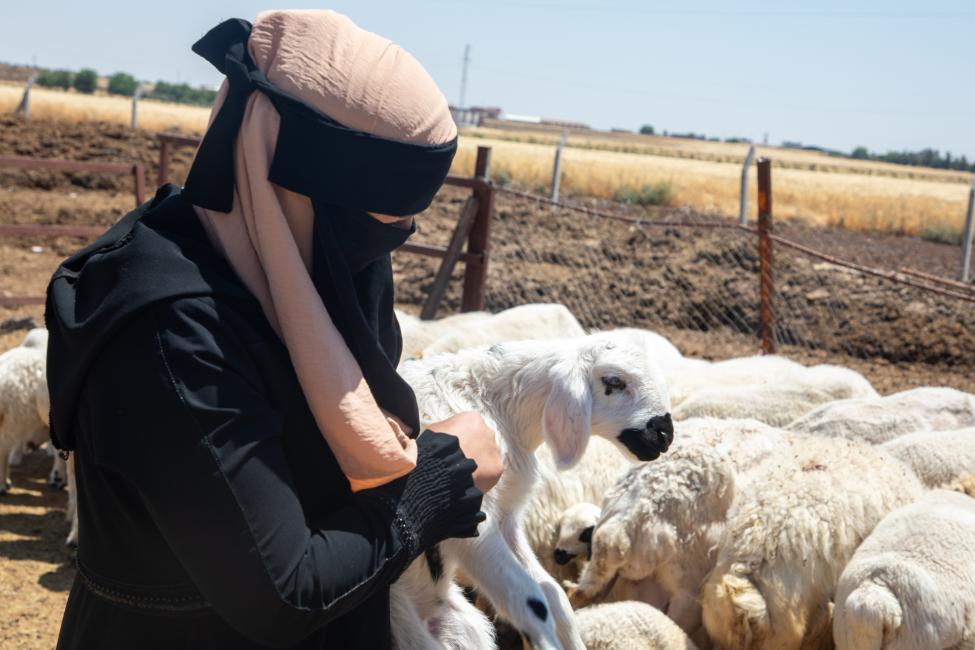-
Who We Are
WHO WE AREThe International Organization for Migration (IOM) is part of the United Nations System as the leading inter-governmental organization promoting humane and orderly migration for the benefit of all. IOM has had a presence in Türkiye since 1991.
About
About
IOM Global
IOM Global
-
Our Work
Our WorkAs the leading inter-governmental organization promoting since 1951 humane and orderly migration, IOM plays a key role to support the achievement of the 2030 Agenda through different areas of intervention that connect both humanitarian assistance and sustainable development. Across Türkiye, IOM addresses the full scope of migration issues, supporting and developing government capacity to manage migration.
Cross-cutting (Global)
Cross-cutting (Global)
- Data and Resources
- Take Action
- 2030 Agenda
When war erupted in Syria, Vefa was working as a livestock farmer, living a simple life with her family.
She would herd sheep and cows, walk them as they were grazing, and produce dairy products to be self-consumed or sold.
Suddenly, they were forced to leave everything behind. Eventually, they settled in Türkiye’s Gaziantep Province.
Despite not being able to resume livestock farming after to being displaced for many years, Vefa never stopped dreaming about going back one day. It had always kept her occupied, both a hobby she enjoyed and a livelihood that allowed her to provide for her family.
When Vefa and her husband Raaid heard about a programme providing support to livestock farmers, they seized the opportunity.
The International Organization for Migration (IOM) and Gaziantep Şahinbey Municipality joined forces to build the potential of 60 migrant and local families working in livestock, supporting them to re-establish or expand their business in a sustainable way.
Türkiye's southeast region, where agriculture has played an important role in the economy, has not been spared by the global impacts of climate change. Depleting pasture areas and water sources are among the challenges faced.
Vefa received a herd of 17 sheep and received training on the latest herding techniques and animal husbandry. “We learned how to look after them properly. Now we have 41 sheep, including 40 females and 1 male.”
As part of the programme, the Municipality identified specific areas for grazing purposes to avoid harming the vegetation and land degradation.
Now back into the swing of livestock farming, Vefa knows how important it is to raise livestock sustainably and in harmony with the environment. If not managed responsibly, overgrazing can have direct consequences on land degradation – affecting land productivity, undermining livelihoods and ultimately threatening food security.
Vefa learned that rotating grazing areas could help avoid overgrazing, while using nutrient-rich sheep waste supports soil fertility.
“We noticed that the lands where the herd grazes become more fertile and greener because of the sheep's waste, which acts as natural fertilizer. By moving between pastures, we also help to disperse the seeds and increase the greenery in the lands. We are careful not to stay in the same land for too long, so that the vegetation is not affected,” Vefa adds.
Through hard work and determination, Vefa and Raaid are increasing their income, food security and well-being, while also contributing to the ecological restoration of the lands around them.
“Our production has increased, and our financial situation has improved.”
Looking ahead, Vefa dreams of establishing her own farm. “We hope to get our own land or farm, because the rent takes up a big part of our income. If we had our own land or farm, we would be able to produce more.”
As we commemorate World Environment Day, Vefa's story serves as a reminder that migrants are part of the solution. When empowered with the right tools, they can be powerful agents of change, working with their communities to combat the greatest environmental challenges of our time.
IOM’s livestock programme was made possible with funding from the U.S. Department of State’s Bureau of Population, Refugees, and Migration (PRM).
Written by Mehmet Boran, IOM Türkiye Senior Communications Associate

